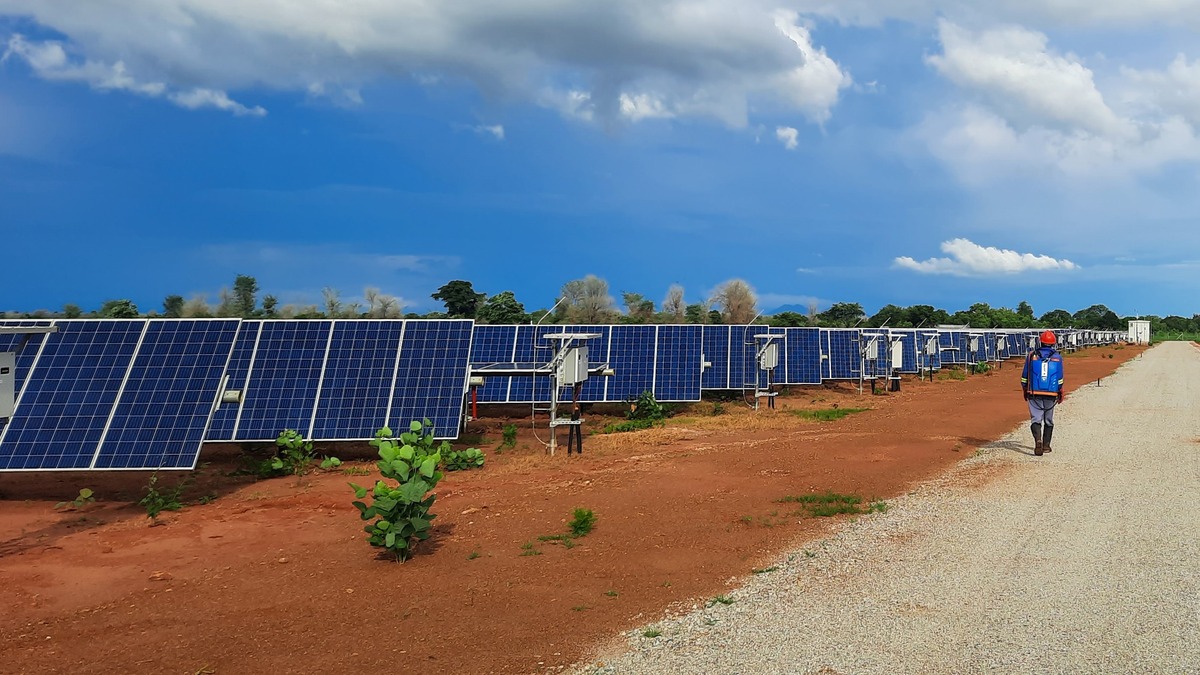UNCTAD urges countries in sub-Saharan Africa to use their vast renewable energy reserves and pool resources through regional cooperation to forge a cleaner and greener future.

© Shutterstock/Tukio | Worker at a solar field in Africa.
Although access to energy has increased in sub-Saharan Africa in recent years, it remains low, as more than 50% of the region’s population still lacks access to electricity.
This low access to energy has implications on health, education, poverty reduction and sustainable development, says an UNCTAD report entitled “Commodities at a glance: Special issue on access to energy in sub-Saharan Africa”, published on 21 March.
For example, lack of access to clean cooking fuels and technology is a major concern, especially for women and girls, who are disproportionately affected by household air pollution, which caused 700,000 deaths in Africa in 2019.
The report warns that without additional efforts, the region’s population without access to clean fuels could increase from 923 million people in 2020 to over 1.1 billion people in 2030.
“Access to a reliable and quality energy supply is vital to the economic development of any country,” the report says. “It drives industrialization, boosts productivity and economic growth, spurs human development, and is crucial to achieve almost all of the United Nations Sustainable Development Goals (SDGs).”
UNCTAD calls on governments in sub-Saharan Africa to accelerate their efforts to expand energy access to avoid falling short of SDG 7, which requires countries to ensure universal access to affordable, reliable and modern energy services by 2030.
Low levels of access to electricity
According to the report, access to electricity in sub-Saharan Africa is the lowest of any world region due in part to the lack of grids that distribute electricity to consumers. And where grids exist, they’re outdated, unstable and lack customer connections.
Also, the lack of sufficient generation capacity, poor transmission and distribution to users, high connection fees, unpredictable income flows and high tariffs discourage consumers from adopting modern energy services.
The low demand coupled with ageing plants and insufficient funding for infrastructure discourages suppliers from innovating and supplying cleaner energy.
Towards a cleaner and greener future
The report says Africa can build a cleaner and greener future by increasing access to clean energy through sustainable and environment-friendly solutions to ensure the region is not left behind as the world moves towards zero-emission fuels.
This would reduce the adverse health effects associated with the use of dirty fuels, introduce efficient fuels in the energy mix and build a climate-resilient energy sector.
Exploiting the vast reserve of renewable energy sources on the continent could help increase electricity generation capacity in the region, helping the transition to low-carbon or zero-emission energy sources.
For example, since Africa has 60% of the world’s best global solar resources, it can use solar photovoltaics as a cost-effective way to provide electricity to the millions of people who lack access.
Africa could also produce about 50 million tons of low-carbon biogas from agricultural residues, animal manure and municipal solid waste through household-scale biodigesters, the report says.
Generating biogas through domestic-scale biodigesters can also potentially provide locally produced low-carbon energy to millions of households in the region.
Listen to The Weekly Tradecast episode "Africa’s dilemma: The need to exploit resources and deal with climate change".
How to unlock the power of the regional market
The report calls for the pooling of regional resources and national grids to unlock the potential of a regional power market in Africa. Such a market could provide regular and reliable energy while lowering the cost of electricity to consumers.
By sharing production capacity for renewable energy sources across borders, countries can strengthen the reliability of their power supplies and improve access to electricity, as nations with surplus energy could exchange power with those experiencing deficits.
Governments need to reexamine their energy investment needs and address them through domestic and international sources of financing.
The report says moving subsidies targeted at fossil fuel production and power generation to clean energy access could help generate cleaner fuels. Countries should also explore various financing options to harness renewable energy resources.


